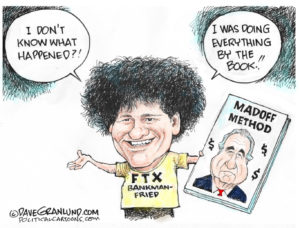The Grift Brothers
Sam Bankman-Fried, William MacAskill and the moral fraud of Effective Altruism. Sam Bankman-Fried and William MacAskill
Sam Bankman-Fried and William MacAskill
UPDATE: On Thursday, March 28, crypto-fraudster and FTX founder Sam Bankman-Fried was sentenced to 25 years in prison and ordered to pay $11 billion for defrauding hundreds of thousands of investors.
Chances are you’ve heard about the latest collapse to roil the world of cryptocurrency. Last month, a sudden liquidity crisis caused something analogous to a “bank run” on Sam Bankman-Fried’s cryptocurrency exchange platform, FTX, causing its collapse, and wiping out 94% of the estimated $15 billion personal fortune of its 32-year-old CEO. Virtually overnight, “SBF”, as he is known, was left with about $900 million, although he now reports having only about $100,000 in his personal bank account. The Securities and Exchange Commission (SEC) and Department of Justice (DOJ) have since opened an investigation into whether SBF committed fraud.
In brief, SBF used FTX customer funds to support his cryptocurrency trading firm Alameda, which was supposed to be separate. This was done secretively through a “backdoor” in FTX’s accounting software that enabled FTX to move roughly $10 billion to Alameda, which bought large quantities of FTX’s digital coin, FTT, to support its price by reducing supply. As of this writing, at least $1 billion of the funds transferred from FTX to Alameda have gone missing, affecting some 1 million creditors, the biggest 50 of whom are owed almost $3.1 billion.
If you followed this story, you’ve likely also heard about “Effective Altruism” (EA), the philosophical movement that benefited from SBF’s short-lived crypto empire. As news of the FTX collapse spread, one article after another began to pick up on the fact that SBF was one of EA’s most prominent members. In fact, he decided to pursue a career on Wall Street — for Jane Street Capital, where other effective altruists have worked — and then in crypto, following a 2012 meeting with EA’s cofounder, a young Oxford University philosophy professor named William MacAskill. Over lunch, MacAskill encouraged SBF to pursue the EA life strategy called “earn to give,” whereby one strives to — quoting a Sequoia profile on SBF—“get filthy rich, for charity’s sake,” even if this means working for what MacAskill himself calls “immoral organization[s].” Although the means may be questionable, they’re justified by the ends: maximizing the “good” that one does in the world.
As a “filthy rich” public figure, SBF continued to follow the EA handbook — or so it seemed — which encourages its followers to be self-sacrificing, frugal and modest. This is based in marketing and public relations no less than a genuine commitment to the idea that, as privileged members of a rich nation, it’s their moral duty to forego unnecessary comforts for the sake of “doing good better.” But whatever the motive, it pays dividends. When MacAskill appeared on “The Daily Show” last September to promote his recent book, “What We Owe the Future,” his announcement that he gives away 50% of his income drew heavy applause. SBF, too, benefitted from media accounts that overlooked clear red flags at FTX to focus on his story as the humble crypto tycoon, practically a monk, who slept on bean bags in his office, shared an apartment with nine roommates, and drove a beat-up Carola.
A series of revelations since last summer, and especially since the FTX debacle, suggest that this was all, for lack of a better word, a massive grift. In reality, SBF owned a $40 million penthouse in the Bahamas, which he called home, and accrued a “local property portfolio worth an estimated three hundred million dollars.” Many of these “were luxury beachfront homes, including seven condominiums in an expensive resort community called Albany, costing almost $72 million.” SBF flew in private jets and purchased a $16.4 million mansion in the Bahamas under his parent’s name as a “vacation home.” FTX employees received free meals and had access to an “in-house Uber-like” transportation service. This is a far cry from the humble lifestyle that EAs, including MacAskill, consistently presented to the public.
MacAskill, meanwhile, has more money at his fingertips than most of us make in a lifetime. Left unmentioned during his “Daily Show” appearance: he hired several PR firms to promote his book, one of which was paid $12,000 per month, according to someone with direct knowledge of the matter. MacAskill’s team, this person tells me, even floated a total promotional budget ceiling of $10 million — a staggering number — thanks partly to financial support from the tech multibillionaire Dustin Moskovitz, cofounder of Facebook and a major funder of EA.
It’s easy to give away part of your income — and sound saintly announcing this on TV — when you have, say, a mansion in the Bahamas or multimillion-dollar budgets to promote your projects and your brand.
Yet SBF wasn’t the only disgraced crypto billionaire courted by MacAskill and EA. As Kerry Vaughan reports, MacAskill earlier described Ben Delo “by name as an important new EA donor,” with Delo becoming a member of Giving What We Can, cofounded by MacAskill, in 2019. That same year, he entered into a partnership with the EA-aligned organization Open Philanthropy, “providing funds, initially in the $5 million per year range, to support” the organization’s mission. The EA community considered him to be “a major EA donor.” In 2020, Delo was charged with “willfully failing to establish, implement and maintain an anti-money laundering (“AML”) program at BitMEX,” a derivative trading and cryptocurrency exchange platform, and is currently serving 30 months probation after agreeing to a $10 million monetary penalty.
The EA community has always lacked integrity, honesty and common-sense.
Zooming out, the EA movement so lavishly funded by SBF, Delo and other tech billionaires has no shortage of additional funds. Just two months ago, before the FTX implosion, EA boasted of a whopping $46.1 billion in committed money, much of it from SBF. Yet even without SBF’s and Delo’s contributions, Open Philanthropy reports that it still has literally “billions of dollars” to give away “over the coming decades.” As Nitasha Tiku reports in The Washington Post, Open Philanthropy has already dished out $255.8 million for “longtermist” causes like preventing superintelligent machines from taking over the world, and poured some $234 million back into the EA community itself, for what it calls “movement building.” The community has so much money that the Oxford-based Centre for Effective Altruism, which MacAskill co-founded, recently bought “a palatial estate near Oxford” called Whytham Abbey, which includes an enormous, sumptuous building constructed sometime in the 15th century.
The reasoning here is that, according to a New Yorker article, such expenditures — including thousands spent on retreats at Wytham Abbey — are worth it “to recruit the next Sam Bankman-Fried.”
* * *
In the wake of the FTX debacle and the profound reputational damage it’s done to EA, many of the movement’s leaders have declared that things like “integrity” and “common-sense morality” have always been integral to the EA worldview. Hence, SBF’s behaviors — if indeed fraudulent — are a flagrant violation of everything EA stands for. “For years,” MacAskill tweeted, “the EA community has emphasized the importance of integrity, honesty and the respect of common-sense moral constraints,” adding that “a clear-thinking EA should strongly oppose ‘ends justify the means’ reasoning.” Similarly, the Centre for Effective Altruism wrote that “effective altruism requires integrity,” and thus, “if Sam Bankman-Fried, and other FTX executives, were involved in lying to, or defrauding, customers then they were not acting in accordance with the principles of effective altruism.”
It’s difficult to take any of this seriously. If there’s a single theme that’s been promoted by EAs more than any other, it’s that the ends justify the means.
This has, in fact, been one of the main criticisms leveled at EA for years. Even the way EAs talk about the importance of integrity, honesty and common-sense morality comes across as strategic, rather than sincere: the reason community members should exemplify integrity and the rest is that it’s expedient for achieving their ends. Fake it, because that’s a good way to make it. As one EA wrote in a document on growing the movement, EAs “should probably avoid moralizing where possible, or doing anything else that might accidentally turn people off. The goal should be to present ourselves as something society obviously regards as good, so we should generally conform to social norms.”
If integrity mattered, MacAskill wouldn’t have told young people like SBF to work on Wall Street and in crypto. He wouldn’t have argued that there’s nothing morally wrong with working for a “petrochemical company” so long as you donate part of your salary to charity. Where was “integrity” when EAs like MacAskill continued to align themselves with SBF—even after SBF described DeFi, which he invested and traded in, as a Ponzi scheme? Where was “honesty” when MacAskill misled, by omission, his Daily Show audience into thinking that giving away half his income was a personal sacrifice? Where was “common-sense morality” when EAs urged people in the Global North to support sweatshops in the Global South? Where was this opposition to “means-ends reasoning” when someone at a major EA conference, which is highly selective of its speakers, literally argued that we should consider investing “in evil to do more good”?
And where was any of this when MacAskill sent private text messages to Elon Musk — a man known for his transphobic tweets, Covid misinformation and casual sexism — suggesting that Musk should actually buy Twitter with SBF?
In truth, the EA community has always lacked integrity, honesty and common sense. This was, in fact, a core component of its brand. It’s what made EA unique and attractive to “moral weirdos,” a term that MacAskill uses endearingly. The about-face in the fallout of FTX’s implosion, with EAs now claiming to care about things like integrity, is just more evidence that the community is a relentless grift. It has billions in the bank, a palatial estate in Oxfordshire, and links to some of the richest people on the planet. Hundreds of millions of dollars are poured back into the community for “movement building,” and leading EAs — while presenting themselves as modest and self-sacrificing — flew in private jets, bought hundreds of millions in Bahamian real estate, and were offered literally millions, from tech billionaires, to boost book sales.
If you want to do good in the world — and you should — steer clear of EA.
Your support matters…Independent journalism is under threat and overshadowed by heavily funded mainstream media.
You can help level the playing field. Become a member.
Your tax-deductible contribution keeps us digging beneath the headlines to give you thought-provoking, investigative reporting and analysis that unearths what's really happening- without compromise.
Give today to support our courageous, independent journalists.






You need to be a supporter to comment.
There are currently no responses to this article.
Be the first to respond.